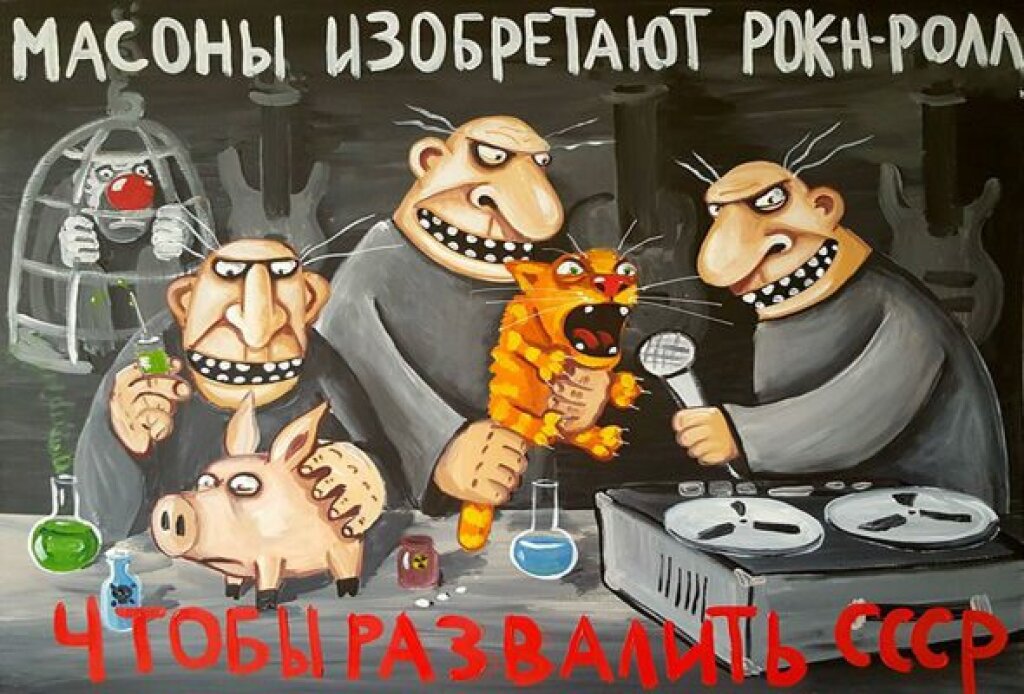Eliot Borenstein is a Professor of Russian and Slavic Studies, Collegiate Professor at New York University, Senior Academic Convenor for the Global Network, and Acting Chair of East Asian Studies.
This post originally ran on the Slavic and East European Blog as part of a series entitled “Russian Studies in the Era of Trump” organized by Ani Kokobobo. Find SEEB on Twitter (@SEEJ_Tweets) and Facebook.
A funny thing happened to me while I was writing my book on conspiracy theory and contemporary Russia: my obscure little corner of Russian cultural studies suddenly threatened to become relevant.
I started working on this topic somewhere during the George W. Bush presidency, but it took far too many years until I could hang up my own personal “Mission Accomplished” banner. Around Obama’s reelection, it became a book project (Plots against Russia; Conspiracy and Fantasy after Socialism, thanks for asking), forthcoming with Cornell in 2019, most likely still under that black swan of American presidents, Donald J. Trump. All of this gives me a vaguely uncomfortable feeling, as though I had just discovered that the name I’ve had my entire life is shared with someone who has recently become a global celebrity—and it will never be just my name anymore. When I tell people I’m working on conspiracy and Russia, instead of the banal response I’ve become accustomed to over the years (“Oh, that must be so interesting!”), I’m now inevitably asked, “So you’re writing about Trump?” and “Is he really being controlled by Vladimir Putin?”
My honest answer comes in two forms. The first, and shortest, is, “How the hell should I know?” There is nothing in my background or skill set to suggest that I have the magic power to search Putin’s pocket to see if it contains the man I must reluctantly acknowledge is our president. And that clearly holds true for every Russia expert consulted anywhere in the media, whether the questioner is an earnest recycler and farmers’ market devotee on NPR or by some latter-day Goebbels on Fox. As Slavists, we are no doubt better informed when it comes to Russia, and are in a better position to interpret a given political statement, event, or disaster, but we confront the same epistemological dilemma faced by educated Russians: the near-complete absence of reliable information and a decades-long tradition that relies on rumor and speculation to compensate for an informational deficit.
Granted, that informational ecosystem is quite different from its Soviet predecessor: in the past, speculation thrived as an alternative to a monolithic, clearly mendacious media apparatus that virtually begged its audience to distrust it and seek alternative explanations. The much-ballyhooed Putinist “firehose of lies” model is more challenging, in that the state media disseminates self-contradicting theories on an almost daily basis, most likely to encourage audiences to give up any hope of finding something one might call “the truth” (a tactic either consciously embraced by Trump, or, more likely, arrived at independently through a series of narcissistic impulses and misfired neurons).
What we Slavists have, to varying degrees, is context, and, in the best case scenario, the capacity for nuance. For example, years of studying and living in Russia have left me invested in the country and its politics more than I am with, say, in those of Ireland, but still less than I am in the political life of the United States. So if I have had years to cultivate a loathing for Vladimir Putin, that loathing is much like the disdain I had for George W. Bush, in that each one damaged his country’s political discourse and restricted personal freedoms (Putin much more than Bush). But when I hear pundits talk about Putin as though he were a cross between Stalin and Voldemort, I roll my eyes and gnash my teeth as if I were taking part in a punk performance inside an ethically compromised cathedral.
All of this makes the study of Russian constructions of conspiracy feel inherently compromised. The American media treat the Russian political system as nothing more than a successful conspiracy in action: if the world is going to hell, it’s because Putin is sitting in a secret bunker with his KGB pals, casually stroking his Siamese cat and cackling softly to himself as he plots the next step in the destruction of liberal democracy. Every now and then he takes out a copy of the infamous “pee tape” and smiles a sinister smile before posting the latest anti-Hillary meme from a fake Texan Facebook account.
The more I study conspiracy, the less faith I have in the possibility of debunking or convincing. People’s assessments of facts (or “facts”) are as much a matter of disposition and worldview as they are of logical judgment. Disposition and worldview are also the key to what we might call propaganda: if Russian state television can convince its viewers that the State Department is trying to destroy Russia, it is because the audience is ready to believe it. Moreover, Russian television provides misinformation about events outside of the viewers’ direct experience. This, to my mind, is one of the key differences between Soviet and contemporary Russian televised propaganda. Soviet television asked its viewers to believe stories (of great economic success, for example) that could be disproved simply by walking out of one’s apartment and into a grocery story. Russian television complements the viewer’s lived experience rather than trying to supplant it.
Take the case of Malaysian Flight MH-17, shot down over rebel territory in Ukraine on July 17, 2014. Virtually no one who has an opinion on the cause of this disaster has any direct experience of the event. Instead, we rely on the news, expert reports, and, of course, speculation and rumor. So why do I believe that the anti-Kyiv rebels are most likely responsible for downing the airplane (or the “Boeing,” a level of specificity insisted upon in the Russian media for reasons that escape me)? First, because it’s the simplest explanation. Second, because of the social media posts by those same rebels immediately after the plane came down, when they apparently thought they had bagged a Ukrainian asset. But finally, it does come down to trust: I have more confidence in the European organizations that have investigated the disaster than I do the Russian government and media, which have spun wilder and wilder theories (It’s the other lost Malaysian plane! The plane was already full of dead bodies! It was an assassination attempt on Putin himself! It was a Ukrainian false flag operation designed to make Russia look bad!) in order to distract from the possibility that the plane was destroyed by Russian-backed rebels using Russian weaponry. But am I in a position to evaluate the technical findings of aeronautics experts on either side? Of course not.
What I have instead is a critical disposition. I have a decades-long disagreement with a colleague at my home university: when the administration does something that strikes us both as completely wrong-headed, he argues for evil intent, while I chalk it up to everyday incompetence. I assume complexity and incompetence as a matter of course, but maybe that’s just playing into the hands of clever people with a sinister agenda. The drawback to his worldview is that it verges on paranoia, and the drawback to mine is that it smacks of naivete.
If we go back to the MH-17 controversy, we find one of the biggest areas of sensitivity for a Westerner writing about conspiracy theory in Russia: the question of Russophobia. After all, the only reason any of these theories about the “real” story behind MH-17 make sense is if we assume that a big chunk of the outside world has an irrational, reflexive hatred of Russia, and dreams of a day when the country is either wiped from the map or put entirely under Atlanticist control. In my book (and, previously, on my blog), I argue that Russophobia for Russia is like political correctness for Republicans: a straw man whose utility lies in rallying the base against an imagined enemy. This does not mean that there aren’t specific incidents that fit the model of “political correctness” gone wild (we know there are, because the same ones keep getting trotted out again and again), or that there aren’t people or institutions in the West that have a reflexive hostility to Russia. But in today’s Russia, Russophobia is used as a discursive club against both internal and external critics. Any allegation that the Russian government might be doing something objectionable is immediately dismissed as Russophobia.
And that is what makes me uncomfortable about studying conspiracy in the shadow of the Trump/Russia scandal (pardon me, “this Russia thing with Trump and Russia,” as our great leader once put it). I am unconvinced that Western criticism of Russia’s actions in Ukraine, or the crackdown on LGBT rights, or the increased censorship over the media and the Internet, is the result of Russophobia. I will also not be surprised in the slightest if we see more and more confirmation that Russian agents interfered and continued to interfere with US elections. But the hysterical tone about Putin and Russia right now plays into Putin’s hands. We are performing Russophobia for a Russian audience that just can’t get enough of it.



